ARTISTS AS WELL as politicians find the opportunity to take a longer view at Columbia
while remaining engaged in creative processes. Director Milos
Forman, whose most recent film, "The People
vs. Larry Flynt," opened in December, values the School of the Arts for providing a place
where both students and teachers can be immersed in thinking about film. "The most
important thing for me is to have this time where you are responsible only to yourself, to
chisel your own artistic vision. The process is almost subconscious, the result of spending time
talking and arguing about movies," Forman says. Even a seasoned journalist can enjoy
the chance to add theory to practice. "In a university people think ideas are important," adds
former Associated Press chief Middle East
correspondent Terry
Anderson, an adjunct at the journalism
school. Anderson's documentary, "Return to The Lion's Den," about his return to Lebanon, where he was held hostage for nearly
seven years, aired on CNN in December. "I have
strong ideas about journalism. I think it's important work. I am quite passionate about its high
purpose, its role in the maintenance of a free society. I believe in those things very deeply, and
I think those are good things to teach to aspiring journalists."
Along with the focus on
ideas comes its flip side, the responsibility to avoid isolation. Stephanopoulos values an
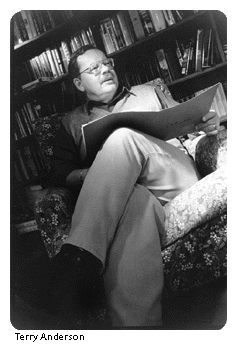 energetic exchange between the academic world and
the larger one. "Academics is the training
ground for people who get into politics, obviously. But also, it's an extension of politics, if you
take the broadest view of politics, which is the life of society." "The university needs to engage
the outside world," says Bernard Tschumi,
the internationally renowned architect best known for his revolutionary Parc de la Villette in Paris,
who was named dean of Columbia's School
of Architecture, Planning and Preservation in 1988. "At the same time it has to keep a
certain degree of autonomy, not to become completely immersed. It needs to be both inside
and outside.
energetic exchange between the academic world and
the larger one. "Academics is the training
ground for people who get into politics, obviously. But also, it's an extension of politics, if you
take the broadest view of politics, which is the life of society." "The university needs to engage
the outside world," says Bernard Tschumi,
the internationally renowned architect best known for his revolutionary Parc de la Villette in Paris,
who was named dean of Columbia's School
of Architecture, Planning and Preservation in 1988. "At the same time it has to keep a
certain degree of autonomy, not to become completely immersed. It needs to be both inside
and outside.
"Architecture is never isolated; it's part of the history of ideas," he adds. "One of the great
things about the university is the discussion about the development of these ideas." That
interaction is most direct in the classroom. Teachers gain a variety of benefits from the
contact with students. "The extraordinary thing with students is they don't take anything for
granted. They're constantly questioning. It creates an unbelievably fertile ground," Tschumi
says.
Stephanopoulos, too, looks forward to two-way communication with students. "I
want to learn more about their attitudes and relationships toward the political system, their
involvement with the political system, and their hopes for it," he says. "I want to be able to
help a new generation of people getting involved with politics understand it and, I hope, get
excited by it."
Theater director Anne
Bogart, whose recent production, "The Medium," is a meditation on the works of media
prophet Marshall McLuhan, says
students help her research artistic trends and new ideas. "They keep me up to date. It's how I
know what's going on in music and popular culture." Students refresh her creativity, she says.
"I can always look at a student I'm working with and say, 'How can light be emotional?' and
they'll come up with whole new answers that I could never think of."
Novelist and
School of the Arts professor Maureen
Howard, whose latest work is Almanac: A Winter's Tale, compares her
students to "cohorts, colleagues, and friends" but warns that teaching is demanding. "The
downside is that you have to be very careful to preserve any time for your own writing. It's
hard to carve out time for one's own interiority." Howard, contracted to teach half-time,
taught a full load last fall so as to take the current semester off to write. Others, like Forman,
take leaves of absence or keep their class loads small to make time to research and execute
their creative works.
Visibility,
leverage, and standards THE
COLUMBIA CONNECTION provides a forum from which researchers can continue to
influence their chosen fields. Gary Sick, senior
research scholar, is probably best known as principal White House aide for Iran during that
nation's revolution and the U.S. hostage crisis. At Columbia, he's founded the Gulf/2000 Project, which
sponsors conferences and an online library on the Persian Gulf region. "I think when you're in
a job in Washington, you're dealing with all the daily crises, the things that come up every 15
minutes, and you seldom have a chance to sit back and think seriously. We still follow the
crises here, but in a more objective way. We're able look at the situation and draw conclusions
from it." As executive director of Gulf/2000, Sick maintains a presence in Persian Gulf
policy. This working community of Gulf scholars has opened new lines of communication
between countries with strained diplomatic relations. Sick intervened when the National Science Foundation wanted to deprive Iranian
scholars of Internet access and uncovered the story when Jordan's King Hussein first met with
the Iraqi opposition to Saddam Hussein. "In some ways," says Sick, "I can accomplish more
here than I did in Washington." Alfred Aho spent nearly 30 years working for Bell Labs (birthplace of UNIX) and Bellcore before becoming chair of Columbia's
computer science department. He sees his position as a platform from which he can improve
the practice of software development in industry. "One of the things I noticed when I was in
industry was the haphazard state of software technology," says Aho. "I visited the nation's
leading software vendors and got an appreciation for the best current practices in software
engineering. My thought was to take this knowledge and turn it into teaching materials that
would improve the state of software engineering education. I also thought I could use this
knowledge to help create a more scientific foundation for software engineering on the belief
that the best theory is motivated by practice, and the best practice is motivated by theory."
Joan Konner was producing public television programs with Bill Moyers when she
accepted the call to serve as dean of the Graduate School of Journalism. "I 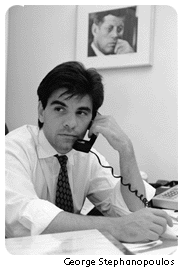 just decided I would do it -- that the school was an important institution in American
journalism and I could try to restore it to its former unchallenged position as the leader in the
field." Konner says the school strengthens journalism by giving reporters "the professional
armature -- good training, a solid ethos of service and responsibility to the public, and high
standards -- on which to shape a career."
just decided I would do it -- that the school was an important institution in American
journalism and I could try to restore it to its former unchallenged position as the leader in the
field." Konner says the school strengthens journalism by giving reporters "the professional
armature -- good training, a solid ethos of service and responsibility to the public, and high
standards -- on which to shape a career."
Above all, these luminaries praise the university for giving them room to choose and develop
their own endeavors, on their own terms. "The academic environment allows you to be more
selective in terms of the work you accept, taking on only the projects one feels are important,"
says architect Tschumi. "One tends not to take the most commercial project, the most
predictable project."
"I'm busy doing a lot of things," says Dinkins. "But among the most fun things I do is
[working] at Columbia. I speak before a lot of groups, and what I say to audiences is that now
that I've been elected a private citizen, I go where I wish. I'm delighted with Columbia."
"Teaching is something I've always wanted to do," Stephanopoulos says,
"and Columbia was a perfect place for me because it's my alma mater, it's very strong in
politics and history, and I love New York. I can't wait to get back."
LAUREN WALKER is a Cambridge-based free-lance journalist who
has written for the Boston
Phoenix, Medical
Economics, and several trade journals. She is at work on her first novel.
PHOTO CREDITS: Joe Pineiro (Stephanopoulos, Dinkins), University Public
Affairs (Forman), Lena Lakoma (Anderson)




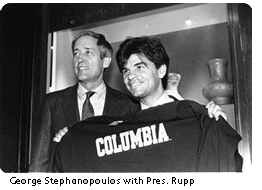 ARE RESEARCH UNIVERSITIES the intellectual health
spas of the power elite? Once you've spent time building a career in politics, the arts, or
industry, is the academy a place to catch your breath? Hardly, according to Columbia faculty
members who first made their marks on the world in non-academic roles. Former Senior
Advisor to President Clinton on Policy and Strategy and Columbia alumnus George Stephanopoulos, for
instance, is coming back to his
alma mater as a visiting professor in political science. He sees this transition not as a
retreat but as a set of new challenges. "From what I can tell about being in a classroom,"
Stephanopoulos says, "facing students every week seems like you're putting yourself on the
line."
ARE RESEARCH UNIVERSITIES the intellectual health
spas of the power elite? Once you've spent time building a career in politics, the arts, or
industry, is the academy a place to catch your breath? Hardly, according to Columbia faculty
members who first made their marks on the world in non-academic roles. Former Senior
Advisor to President Clinton on Policy and Strategy and Columbia alumnus George Stephanopoulos, for
instance, is coming back to his
alma mater as a visiting professor in political science. He sees this transition not as a
retreat but as a set of new challenges. "From what I can tell about being in a classroom,"
Stephanopoulos says, "facing students every week seems like you're putting yourself on the
line." 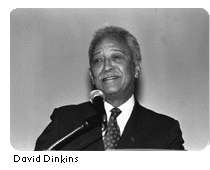 Former New York mayor
Former New York mayor 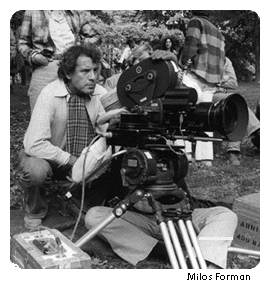 Dinkins, too, Columbia provides more flexibility to pursue his many interests. "In
government, one has to think of the magnitude of the city and the job of being mayor. You
truly do work around the clock; you're on call always. Here, there's more freedom."
Dinkins, too, Columbia provides more flexibility to pursue his many interests. "In
government, one has to think of the magnitude of the city and the job of being mayor. You
truly do work around the clock; you're on call always. Here, there's more freedom."
 energetic exchange between the academic world and
the larger one. "Academics is the training
ground for people who get into politics, obviously. But also, it's an extension of politics, if you
take the broadest view of politics, which is the life of society." "The university needs to engage
the outside world," says
energetic exchange between the academic world and
the larger one. "Academics is the training
ground for people who get into politics, obviously. But also, it's an extension of politics, if you
take the broadest view of politics, which is the life of society." "The university needs to engage
the outside world," says  just decided I would do it -- that the school was an important institution in American
journalism and I could try to restore it to its former unchallenged position as the leader in the
field." Konner says the school strengthens journalism by giving reporters "the professional
armature -- good training, a solid ethos of service and responsibility to the public, and high
standards -- on which to shape a career."
just decided I would do it -- that the school was an important institution in American
journalism and I could try to restore it to its former unchallenged position as the leader in the
field." Konner says the school strengthens journalism by giving reporters "the professional
armature -- good training, a solid ethos of service and responsibility to the public, and high
standards -- on which to shape a career." 




